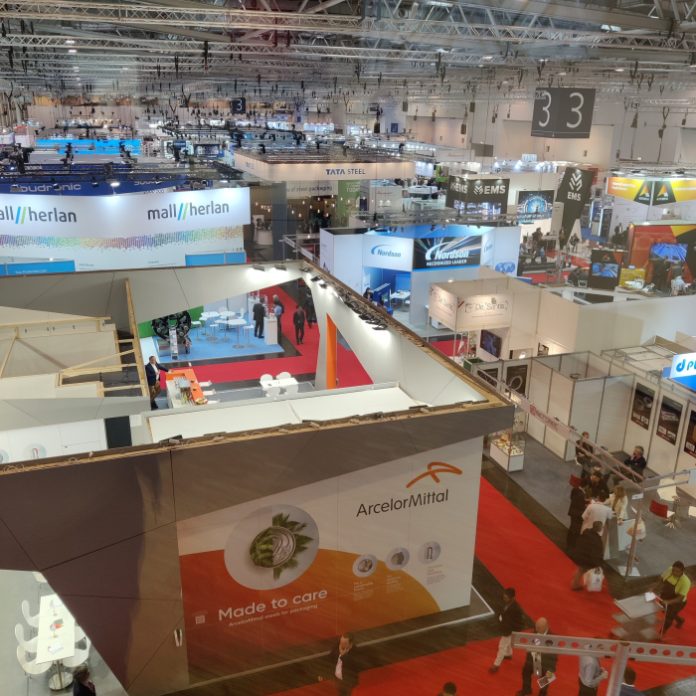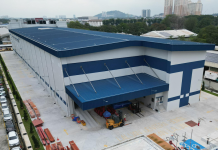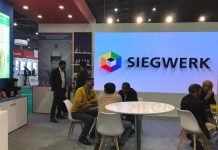One of the world’s leading exhibitions for metal packaging, Metpack, kicked off on 2 May in Essen in Germany after a gap of six years on a cold misty morning that eventually became a sunny day. During the five-day expo, visitors will experience new technologies and advanced processes for the production, coating, lacquering, printing and recycling of cans, tubes, closures and technical packaging made of metal.
At the opening conference on the morning of 2 May, the speakers included Oliver Kurt, the CEO of Messe Essen, Wolfgang Niemsch, chair of the Metpack committee and the managing director of Lanico Mashcinenbau Otto Niemsch, Alexander Hinterkopf, the managing director of Hinterkopf, and Claudia Bierth, chair European Affairs Commission at Metal Packaging Europe and managing director of the Forum Beverage Can (Germany).
Essentially, the opening conference reasserted the new spurt of growth in the metal container industry, largely propelled by the 100% potential of recycling metal packaging. Hinterkopf spoke of the traction that his company’s digital inkjet machines are gaining in the market.
Claudia Berth spoke about the work in the European Union to level the playing field for the metal beverage container industry where the wine and spirits sector are exempt from many of the recycling regulations because of their strong lobbies.
Oliver Kuhrt mentioned that the Metpack Innovation Awards will be presented on the second day of the trade show and are expected to be among the highlights of the five-day event.
Sustainability an overriding theme at Metpack 2023
Sustainability is an overriding theme at Metpack 2023 with decarbonization, energy and resource efficiency, a circular economy, digitization or the Internet-of-Things being just a few of the topics currently being talked about by the metal packaging industry.
In Halls 1, 2 and 3 of Messe Essen, international exhibitors will present their innovative products and services. Manufacturers will show their machines in action or invite visitors to the stand to get to know them personally and to network.
“We are looking forward to 318 exhibitors from 26 nations and a top-class trade audience from all over the world. Metpack 2023 will give the global metal packaging industry valuable impetus to shape the future sustainably,” said project manager Christina Kleinpaß.
Trends, innovations and developments
The Metpack Conference on the second day of the trade show from 9 a.m. to 1 p.m. in the Congress Center West will offer further opportunities for professional exchange. A total of 12 experts will provide information on the latest developments in can making in nine presentations.
In the keynote address, Daniel Abramowicz, CTO Crown Holdings, will trace the technical developments of the last 25 years. The rest of the technical conference will focus on innovative processes in steel production, surface treatment and lacquering, as well as a new bodymaker design and a smart factory for easy-open ends. Participating companies are Koenig & Bauer MetalPrint GmbH, Henkel, Stolle Machinery Company, Enpack Europe, Chrotex, Nippon Steel Corporation, Suzhou SLAC Precision Equipment Co, OKL Engineering, Plasmatreat, Actega Brasil and Brasilata Labs.
The best technical developments and innovations at Metpack will be honored with the Metpack Innovation Award. In the run-up to the trade fair, 19 exhibitors with a total of 31 innovations had applied for the popular industry award in the bronze, silver and gold categories. At 2 p.m. in the Congress Center West, the three companies that impressed the seven-member jury most with their innovativeness and inventiveness will be announced.
Exhibitors present ‘old treasures’ in Hall 1
In addition to their current products and trade fair innovations, some exhibitors will take Metpack visitors on a journey into the past. In the trade press lounge in Hall 1, Container Machinery Heilbronn, Lanico-Maschinenbau Otto Niemsch, Mundolatas, Remy International and the Wallram Group will be presenting historical exhibits from their history. These include, for example, steel beverage cans with old Church Key openings as well as several capping machines and a hand polishing block from the first half of the last century. Visitors can also see a can that was riveted instead of welded.










